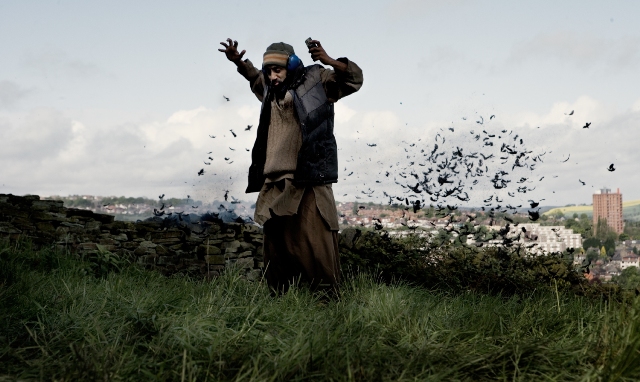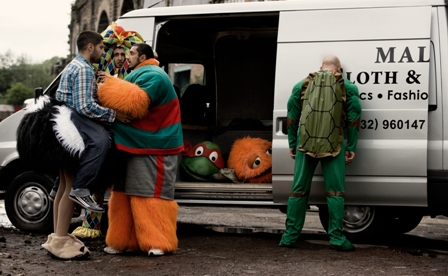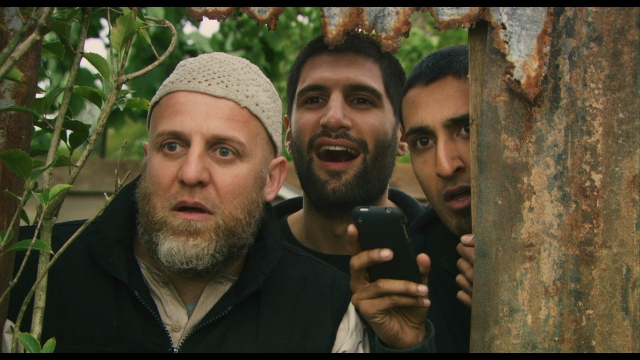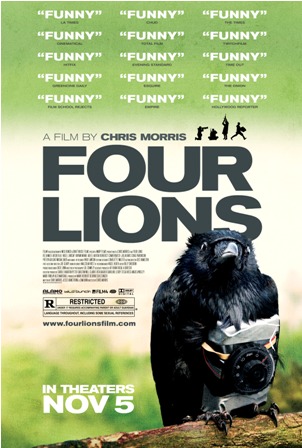CHICAGO – Excelsior! Comic book legend Stan Lee’s famous exclamation puts a fine point on the third and final play of Mark Pracht’s FOUR COLOR TRILOGY, “The House of Ideas,” presented by and staged at City Lit Theater in Chicago’s Edgewater neighborhood. For tickets/details, click HOUSE OF IDEAS.
Interview: ‘Four Lions’ Filmmaker Chris Morris Explores Absurdity of Terrorism
CHICAGO – Chris Morris has never been the type of comic to shy away from controversy. His uncompromising, fiercely satirical work has consistently broke ground and raised eyebrows, from his acclaimed BBC Radio broadcasts to his award-winning TV shows “The Day Today,” “Brass Eye” and “Jam,” which gained notoriety for their refusal to treat any subject as sacred.
For his feature filmmaking debut, Morris has decided to tackle perhaps his most squirm-inducing subject yet: terrorism. His new comedy, “Four Lions,” centers on a group of British jihadists as they plan out their mode of attack. The ensemble of characters—led by Omar (Riz Ahmed), Waj (Kayvan Novak), and Barry (Nigel Lindsay)—are depicted not as cartoonish monsters, but as misguided, fallible and often dim-witted human beings, much like the politicians in last year’s equally shrewd satire, “In the Loop” (both films were co-written by Jesse Armstrong). Though these young men may hate western culture, that doesn’t stop them from engaging in an online Puffin Party, or singing along to “Dancing in the Moonlight.”
HollywoodChicago.com spoke with Morris about his favored brand of satire, the unbelievably true stories he discovered through his research, and the formidable logistics of staging an action sequence set during the London Marathon.
HollywoodChicago.com: What attracts you to exploring the psyches of dimwitted characters?
Chris Morris: Well in this case, it was the fact that examples of dimwittedness threw themselves up quite unexpectedly when I was reading about [terrorism], which I thought was a serious subject. It is a serious subject, but in [my research], I encountered aspects of it that were just silly, and people doing things that were either incompetent or plain daft. The story that kicked me into this was about five Yemeni jihadis who wanted to blow up a U.S. warship with an exploding boat. They assembled at the quayside in the pitch dark and they put their launch in the water. They filled it with explosives and it sank. And I thought that was a more amusing story than one might expect to find. I spoke to journalists who had been detailed to talk to an insurgent in Iraq and he didn’t turn up. And by and by he didn’t turn up. Then a few hours later, a friend of his turned up and the journalist said, “Where is he?” He goes, “Oh, he was carrying some explosives out in his garage this morning and he tripped over.” So you get different types of comic occurrences in the midst of this serious subject and because they are surprising and interesting, I thought they might be worth sharing with a few people in the form of a film.

Adeel Akhtar stars in Chris Morris’s Four Lions..
Photo credit: Alamo Drafthouse Films
HollywoodChicago.com: I was reminded of your anchor on “The Day Today” who asked his physical cartoonist to “make us smile about the bad things in the world.” Was that your intention with this film?
Morris: Well, I wouldn’t want to pull that away from somebody who was feeling good about seeing the film, but the intention was not to provide a sort of medication against the troubles of the world. I think it was more to push through the very two-dimensional version of this kind of event or these kinds of people that you get from the mass media. I wanted to expand that and show things that I found in the record, and that I found in talking to people, going to court cases and seeing surveillance transcripts. Wherever I looked, I found this rather unsurprising (if you think about it) account of people making average human errors. I felt that a comic version of that produces a sense of dissonance in the right direction. In other words, you have to rethink. So there’s a lot going on in the same picture, but I wouldn’t have done it if these events hadn’t been funny.
HollywoodChicago.com: What particular stereotypes did you find debunked by your research, and how did they influence the film’s comedy?
Morris: In every direction, you find stereotypes being broken or concepts being broken. People talk about “the Muslim community.” You realize that there’s no such thing as “the Muslim community” when you go into places like Britain, where it’s dominantly a Pakistani Muslim population, but there are also Middle Eastern Muslims in Britain as well. So there’s no unified Muslim community, even within those people whose families originally came over here from Pakistan and India. There are so many different communities which relate to the village communities of their families. A lot of these people come from small villages in places like Kashmir, and they retain that composition when they move in to British cities. So all of that produces divisions within the community that undermines this idea that it’s one unified thing.
So that’s sort of the basic level, and then all the way through—fundamentalists are not the same as terrorists. People think that [Muslims] with long beards and a strict-looking outlook are more likely to turn into terrorists. People think that terrorists are well-organized and in some way masterminded, and the whole thing becomes much more frail. That’s not to say it doesn’t happen, it’s just the nature of the way it does happen is more—it’s not quite haphazard, but it’s what happens if you try to run secret operations undercover. You have to look at these things as they would see it: behind enemy lines, with relatively little support, using not exactly your prime available troops. It seems most unlikely that the average fallibility of human beings is going to take a polite sidestep around the jihadi cell and then carry on as usual when it meets a team of motor mechanics or a football team or a stag weekend or whatever it is.
 Kayvan Novak, Arsher Ali, Riz Ahmed and Nigel Lindsay star in Chris Morris’s Four Lions. Photo credit: Alamo Drafthouse Films |
So, to answer your question, bits ranged from really small [moments] like a snippet in the surveillance evidence where a guy comes into the room and says, “Hey bro, what day is it tomorrow?” The other guy says, “It’s the 23rd,” and he goes, “Okay, so is it the 24th after that?” It was things like that which make you go, ‘Hang on a second, that’s sounds so stupid, he must not have been concentrating,’ but at the same time, it opens another angle. It’s the same with Khalid Sheikh Mohammed, the mastermind of the 9/11 attacks. It took him two hours to prepare for a TV interview because he had to find a costume that wouldn’t make him look fat. Then when he went on camera, he tossed out a lot of Qur’anic quotes and got them all wrong. That [image] is not quite the same as the one of a demon who has been waterboarded 183 times and to this day is still unrepentant. Do you see what I mean? They’re all sides to the same character. And then you get full, flat out sight gags. There’s a guy recently whose job it was to blow up the Saudi prince using a suppository bomb. So he secreted the bomb in his orifice, and he walked into the Saudi Prince’s tent. He greeted him, whipped out his detonator, hit the button, and fired himself straight through the ceiling. So if these kinds of things are happening in real life, for god’s sake get them on the screen now.
HollywoodChicago.com: What was the nature of your collaboration with co-writers Jesse Armstrong and Sam Bain?
Morris: I worked with Sam and Jesse because I think their specialist subject is the flawed male, and they’re brilliant character writers. They write in a different rhythm to the way I write. So I figured that if we could pool our strengths, we might be able to come up with something that was halfway decent. They’re really good at seeing the character dynamics of the situation. I would come in and discuss something I had seen after hanging with out with a bunch of Muslim guys. I’d notice the way they related to each other or related to their parents or were worried about a particular thing and how that affected them as a group. Sam and Jesse would have to listen patiently, and at some point, when we were writing about our fictional characters, those observations might come back into the ring and we’d discuss them in relation to Omar and Waj.
We’d also look at preexisting known cells, and try relating, say, the London bombers to the Beatles. Which one is John, which one is Paul, etc.? They’re very good at doing that, and it was just a very enjoyable and fruitful collaboration. They see things in a way that only adds to what I was observing, so it was just a pleasure. I think the dialogue was kind of an organic process. I initially wrote some dummy scenes to describe characters. It was pretty early on when I wrote the scene where Barry punches himself in the face. We [whipped] the script into shape over more than a year, just getting it structurally correct, and describing the scenes, but obviously when you’re describing the scenes, you will drop a sentence or two of dialogue within a paragraph in order to give it some character. So it just evolves like that. Sam and Jesse wrote the first official draft from those scraps—from dummy scenes, our scene by scene breakdown and so on.

Nigel Lindsay, Kayvan Novak and Riz Ahmed star in Chris Morris’s Four Lions.
Photo credit: Alamo Drafthouse Films
HollywoodChicago.com: Was the script constantly being rewritten during production?
Morris: Yeah, it just didn’t stop. I wrote nine or ten drafts after that first one, altering it enormously. The first draft was really massive, and so I’d clobber it down. I got a lot of the speech rhythms from these guys I was hanging out with, hearing the tics in their modes of speaking, and feeding those in. And then even on the day of filming, when you thought you had a lockdown script, I’d say, ‘Well, look, it sounds funny when you say ‘puffin.’ See if you can say ‘puffin’ two or three times.” Or at the other end of it, Kayvan would lob in a line once we were shooting with the freedom to do that. They knew they could lob in a line. It didn’t change the scene, it just added something that kept it alive.
HollywoodChicago.com: How did your cinematographer, Lol Crawley, allow the cameras to be loose enough to capture these spontaneous interactions?
Morris: We shot on two Sony 900 cameras. They are slightly old-fashioned HD cameras, and the brief was just to follow the ball, so that you’d follow the conversation. They were just behind the ball most of the time, so you could get the feeling of following it with the natural speed of the eye. Sometimes, of course, when you’re watching a conversation, you’ll flick across to someone else to see what they’re thinking while someone else is talking. I also made sure to jam the [cameramen] into difficult corners to get the material because you’re often not in the ideal place. If you’re too much in the ideal place, it feels set up.
 Four Lions was released in local theaters on Nov. 12. Photo credit: Alamo Drafthouse Films |
HollywoodChicago.com: How did you go about approaching the logistics of the film’s complex climactic sequence set at the London Marathon?
Morris: Basically, I went out to the London Marathon with a cameraman in 2008, and we shot various positions to get a big mass of runners. Then I built a storyboard which incorporated about two or three of those shots, while creating a fictional space around the shots, placing those imaginary camera positions to look at where the characters would be. We dovetailed that into the coverage of the Sheffield Half Marathon, where we shot our action scenes. So there was officially a half-marathon which we got permission to run in. We ran with a group of fifty extras as a kind of mass within the large body of marathon runners, and Omar had to break in. It was actually Mark Herbert, the producer, who broke through the barriers and into the protection of that ring of fifty extras, which included the stuntman in the wookie outfit. The logistics were all set up by our first A.D. Joe Geary, who did a great job, and it was probably the best day of the shoot. I think we had seven cameras on that.
HollywoodChicago.com: There’s echoes of “Dr. Strangelove” in the film’s startling music choices, particularly “Dancing in the Moonlight.” How did that song make the soundtrack?
Morris: I found that British Pakistani Muslims have a pretty striking range of musical tastes. It’s fair to say that almost all of them like hip hop; they like Tupac, 50 Cent and Jay-Z. But related to that, they also have really weird anthemic choices, which are either “good time” or stadium fillers, whether they were tracks by Foreigner or Queen. I also came across a few heavy metal bands like Black Sabbath; Prince, Celine Deon, and there were some brit-pop choices too like Oasis and Supergrass. I just thought, ‘Okay, we really do have a license to choose the silliest track we could think of think of.’ And I thought of Toploader’s “Dancing in the Moonlight,” because all the tracks the [British Pakistani Muslims] liked were very catchy, and yet that track was so catchy it’s almost ridiculous. One of the weird things about these [terrorist] operations in real life is that people frequently seem very jolly as they go into them. And why wouldn’t they? They’ve done their praying … and it’s a bit of a relief. “Dancing in the Moonlight” is not utterly impossible to imagine, and yet it is pretty bizarre. Sometimes when you see suicide bombers on security cameras before they go off to murder a load of people, they seem very buzzed up, because they believe all is right, and all is about to get a lot righter.
HollywoodChicago.com: They feel their reward is coming in the near future…
Morris: And by the way, the biggest element of that reward is the fact that it’s actually pretty hard to get a free pass into heaven. If you slip up, you spend the rest of your life in unremitting agony. Some of the descriptions of what happens to you in hell in Islam are powerfully, physically repulsive.
HollywoodChicago.com: We often hear stories about the virgins promised to jihadists in the afterlife. We don’t hear much about that other stuff…
Morris: Yeah, I think it’s mainly the other stuff. I mean, yes there are virgins. There are also comfortable seats, there’s endless fruit, there are rivers of milk and honey, and some rivers are described as a non-intoxicating wine. The images vary, but I think the images are those that would be most attractive to somebody who essentially was being boiled in a desert sun.
 | By MATT FAGERHOLM |


